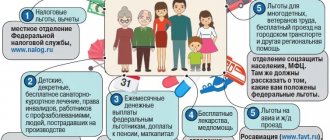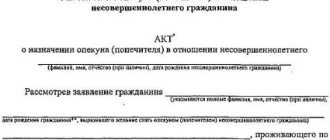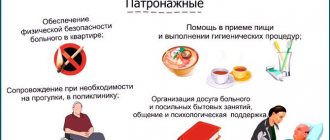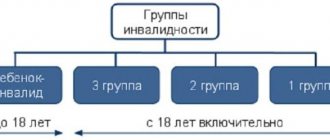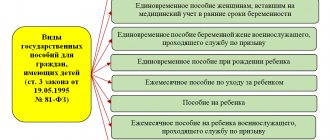People with disabilities are a problem in any society - they belong to vulnerable segments of the population, cannot earn their own living and require constant supervision and care. The state assigns various payments and benefits to disabled people of all three groups, paying special attention to disabled people of group I. In their case, it is necessary not only to provide them with material resources, but also to allocate monetary incentives from the budget to those who care about them. In addition to payments, various benefits have also been established for guardians of group 1 disabled people in 2021.
How to obtain guardianship over a disabled person of group 1
Not everyone can become a guardian of a group 1 disabled person. Caring for a disabled person, often unable to provide for their own personal needs, is hard work. Those who wish to formalize guardianship over a disabled person are subject to certain requirements; if they are not met, the Pension Fund will refuse to formalize guardianship and conclude an agreement:
- the guardian must be at least 18 years of age;
- he must be capable and healthy;
- he should not be deprived of parental rights;
- he must not have a criminal record;
- he should not be registered in a psychoneurological dispensary.
First of all, you need to go to the local department of social protection of the population in order to fill out an application, which would indicate the desire to formalize guardianship over a disabled person of group 1. Together with the rest of the documents discussed below, it will be transferred to USZN specialists, who will review them within 14 days. If the decision is made in favor of the applicant, he will be summoned to the social security department to sign papers and receive the status of a guardian of a disabled person.
If he is denied, he will receive a notice stating the reasons for the denial.
Who can become a trustee
In order to receive the required benefits for guardians of incapacitated disabled people, it is necessary to meet certain requirements:
- be able to work, that is, be able to take care of the patient;
- have no criminal record;
- do not suffer from mental disorders;
- age from 16 to 60 years.
Important!
When choosing a guardian, preference is given to close relatives. The money paid by the state is compensation for the fact that the guardian cannot allocate enough time to earn money. But if there is other income in it, then you should not pin your hopes on payments.
To register you should follow these steps:
- collect the necessary package of documents;
- transfer of collected documentation to the guardianship authorities and the Pension Fund.
Guardianship over an incompetent person is allowed to be issued to medical institutions where the patient is registered.
What documents are needed to register guardianship of a disabled person?
To prove your suitability to become a guardian of a disabled person, you must provide the following set of documents to USZN employees:
| Document | Where to get it |
| Russian passport | Ministry of Internal Affairs of the Russian Federation |
| Certificate of registration at place of residence | Passport Office |
| Brief autobiography of the applicant (in free form) | – |
| Application form of an applicant for the status of a guardian of a disabled person (in free form) | – |
| Certificate of no criminal record (has a limited validity period - 1 month) | Internal Affairs Bodies |
| Documents confirming the presence of family ties (if there are family ties) Birth certificate, marriage certificate, divorce certificate, certificate from the Federal Migration Service, certificate from the Municipal Administration, etc. | Civil registry offices, local government bodies, Federal Migration Service of the Russian Federation |
| Certificate of income of the future guardian | At the place of work, Employment Center, Pension Fund |
| Conclusion of a medical and social examination or a court decision declaring a person incompetent | ITU Bureau, Clerk of the Court |
| Written consent of the relatives of a disabled person to establish guardianship | Close family members of a disabled person |
What is guardianship
Guardianship is a form of protection of the rights and interests of a citizen who, due to physical or mental disorders, needs constant care.
There are three types of guardianship:
- Patronage.
- Full custody.
- Guardianship.
Patronage is caring for a capable person. This form of guardianship implies the protection of the interests of an elderly person or a disabled person in all instances and the resolution of everyday issues on the initiative of the principal.
If an elderly or disabled person is given the status of an incapacitated person by a court decision or has psychological or physical health problems, he is assigned full guardianship.
Guardianship is appointed over people whose legal capacity is limited by a court decision. This category of persons is aware of their actions, guides their actions, but due to physical limitations, they cannot fully fulfill daily needs. In some cases, guardianship is issued over people who, due to addiction to alcohol and drug addiction, put their family in a difficult financial situation.
What payments are provided for guardians of group 1 disabled people?
The amount of payments will depend on the region of residence of the guardian and the disabled person for whom he is caring.
Among the payments intended for guardians of disabled people of group 1 are the following:
- Monthly benefits in the amount of 3357 rubles .
- Disability pension. For guardians caring for a disabled person whose disability was acquired during life, the amount of the pension payment will be 9,538 rubles . If we are talking about looking after a disabled child, the pension increases to 11,445 rubles .
- Payments established for a father or mother forced to leave their job to care for a disabled person of category I. The benefit amount is 60% of the minimum wage in the region.
Benefits and pensions are paid both to carers who are relatives of disabled people and to carers who have been hired to look after a disabled person. The only monthly allowance issued by the guardian for himself may be lower.
Incapacitated disabled people: discounts for their caregivers
Benefits for guardians caring for incapacitated people with disabilities are provided in much smaller quantities than for persons who care for minor children with disabilities.
Thus, government resolution No. 343 of June 4, 2007 provides for a monthly allowance for this category of trustees. Attention! Such compensation is due to the person who actually takes care of the incapacitated citizen. However, it may not be officially issued. To receive benefits, guardians of disabled people must contact the Pension Fund and present the following documents:
- statements from both parties;
- a certificate from the Pension Fund of the Russian Federation, which confirms care for the sick person;
- a certificate issued by the employment center, which indicates that the assistant does not receive unemployment benefits;
- extract from ITU;
- a conclusion confirming the need to care for a sick person;
- civil passport of the guardian;
- work books of both participants.
Important!
If the caregiver does not process payments on time, the registration procedure can be completed later. The guardian will be paid money for the previous months. The maximum period for which funds can be returned is 3 years.
Social benefits for guardians of disabled people of group 1
In addition to the payments that people who devote themselves and their time to caring for disabled people deserve, they are entitled to a certain set of social benefits. Here is a list of them:
- free ticket for any city transport;
- 50% discount on telephone services;
- reducing the amount of transport tax in relation to one vehicle;
- reduction of land tax in relation to one plot of land;
- exemption from property tax paid for one piece of real estate;
- free vouchers to health resorts;
- 50% discount on utility bills;
- benefits in the field of labor relations (mothers of disabled children under the age of 8 are given the right to work part-time or work on a reduced working day with payment for the time actually worked; involvement in overtime work and business trips only with the consent of the employee).
Types of government support
Let's take a closer look.
Where to find out what kind of help you can get
Tax deductions
A person who cares for a disabled citizen has the right to count on receiving standard and social tax deductions.
Read also: Queue to land
The standard tax deduction is 6,000 rubles. Social deductions are provided on the basis of a pension or insurance agreement with the state. Moreover, the above documents must necessarily be issued to the disabled citizen, and not to the guardian caring for him.
Benefits for guardians of incapacitated disabled people
If a person takes care of a disabled person who has been officially declared incompetent, he has the right to count on receiving a number of benefits and privileges from the state.
But despite the complexity of the task assigned to him, the amount of payments will still be less than for guardianship of a disabled minor. The resolution regulates only the minimum amount of benefits that must be paid to such citizens. At the moment, this minimum is only 1,200 rubles. In each region of the Russian Federation, the authorities have the right to independently revise the amount of payment and set it at a level acceptable to the budget.
Attention! Providing benefits is possible only for those citizens who are caring for an incapacitated person. Moreover, there are no requirements at the legislative level regarding the presence or absence of a guardian’s official place of work.
In addition to financial payments, citizens are provided with the following state support measures:
- Possibility of free legal assistance.
- There is no fee when filing claims in relation to property whose value exceeds 1,000,000 rubles.
- All notary services are provided with a 50 percent discount.
Each region provides its own list of benefits provided to this category of citizens, so you can clarify the exact support measures only in your social security department.
For example, in Moscow an additional discount of 50 percent is provided when paying for major repairs. In addition, a 50 percent discount is provided when paying for an MTPL policy.
In most regions of the Russian Federation, guardians of incapacitated citizens are provided with the following additional support measures:
- Extraordinary provision of land for the construction of your own residential building.
- Exemption from payment of transport tax for a car with an engine power of up to 200 hp.
Payments for guardians of citizens with disability group 2
Transfers of funds for caring for a disabled person of the second group are carried out from the federal and regional budgets. The following benefits are currently set:
- 5,500 rubles for caring for a disabled child.
- 1,200 rubles when caring for certain categories of citizens with disabilities.
Payments to guardians of citizens with 1st disability group
Guardians of citizens with the first disability group have the right to receive monthly financial assistance from the state. The following types of state support are paid in the Russian Federation:
- The standard payment is 60 percent of the minimum wage established in the region of residence of the beneficiary.
- When caring for a disabled person from childhood, the payment amount is 11,445 rubles.
- The amount of additional benefit is 3,357 rubles.
Depending on the region of residence of the guardian, the amount of payment provided to him may differ significantly, since it is set by local authorities based on the available budget.
Getting additional privileges
Citizens who care for a disabled child have the right to apply for the following types of additional privileges:
- Half-holiday.
- Registration of four additional paid days off.
- Do not work on holidays and weekends, regardless of the schedule approved by the organization.
- Do not go to work at night.
- Don't work overtime.
- Do not go on business trips.
- Receiving additional unpaid leave, the duration of which is up to 14 days.
Read also: Rehabilitation and habilitation programs for people with disabilities
Citizens who care for children with certain diseases have the right to retire earlier. By law, every 18 months of such care removes one year of retirement age. The maximum number of years by which the age can be reduced is 5.
On a note! Families raising a sick child have the right to receive a discount on utility bills.
Benefits in the field of labor legislation
Citizens who provide care for persons with disabilities have the right to enjoy the following labor benefits:
- Possibility to work on a reduced schedule.
- Such citizens are given 4 additional days off per month, which are fully paid.
- The ability to not go to work on weekends and holidays, even if the organization provides for such a schedule.
- Possibility to refuse business trips and work overtime.
- Opportunity to take additional unpaid leave. The duration of such leave is 14 days within one year.
Tax benefits
Citizens who care for a person with a disability have the right to apply for a tax deduction. It comes in two types:
- Standard, the size of which is 6,000 rubles.
- Social, the size of which varies depending on the region of residence of the person and the characteristics of providing care for the disabled.
Social deductions are provided only for contracts issued in the name of a person under guardianship.
Benefits in the housing and communal services sector
Guardians of citizens with disabilities have the right to enjoy privileges in the field of housing and communal services.
In particular, they are given a discount on payment of housing and communal services bills, the amount of which is up to 50 percent. Most often, such a privilege is provided in the form of a subsidy, when a person is returned part of the money previously paid for utilities.
Benefits in the field of education
In the field of education, a guardian can only take advantage of the benefits provided for a child under his guardianship:
- If this is a full-time student, he is provided with financial support for the entire period of study.
- Discounts are provided for education in preschool institutions.
- The school provides two free meals a day.
- Free textbooks are provided.
Regional support measures
Most of the benefits are provided at the regional level. For example, in Moscow, guardians are provided with:
- reimbursement for utility bills;
- compensation for raising a child with a disability;
- financial support for a full-time student;
- compensation for raising an abandoned child.
In addition, material benefits are provided:
- Discount on preschool education.
- Free travel on public transport.
- Free two meals a day in an educational institution.
- Free medicines until the child reaches 3 years of age.
- Free textbooks.
Advice! In each region of the Russian Federation, the authorities have the right to independently adopt a list of benefits provided to guardians of disabled people. You can get acquainted with the privileges at the local social security office, as well as clarify the list of necessary documents for their registration.
Common mistakes
Error: The remuneration of a guardian of a disabled person is estimated by him at 15% of the disabled person’s income.
Comment: Payments to guardians of disabled people cannot exceed 5% of the total income of the person under guardianship.
Error: A citizen who has been assigned a disabled group is going to become the guardian of a disabled person of group 1.
Comment: The conditions for obtaining the status of a guardian of a disabled person are good health and legal capacity of the future guardian.
Rights and obligations
Article 36 of the Civil Code of the Russian Federation defines the rights and obligations of the guardian and patronage assistants. Their rights include:
- Possibility to live with the ward.
- When appointing paid guardianship, the opportunity to use the property of the ward.
- Receive remuneration for helping the ward (in case of paid guardianship).
- Receive benefits (only if you are unemployed).
- Take advantage of regional benefits for travel, utility bills, etc.
The responsibilities of guardians, trustees and patronage assistants include:
- Take care of the health of the ward.
- Help him restore his capacity.
- Create comfortable living conditions for him.
- Satisfy his basic needs.
- Protect the rights of the ward and represent his interests in government bodies. In the case of patronage, this can only be done if there is a power of attorney from the ward (based on Article 41 of the Civil Code of the Russian Federation).
- Manage the funds of the ward. Receive his income and pay his expenses. In case of patronage also by power of attorney.
- Carry out transactions on behalf of a disabled person (in case of guardianship only with the consent of the PLO, on the basis of Article 37 of the Civil Code of the Russian Federation).
- Protect and preserve the property of the ward.
- Report annually on the expenditure of funds and disposal of property of a disabled person.
- Notify the Public Organization when changing the place of residence of a disabled person and a guardian.
At the same time, the law imposes a ban on a number of actions of guardians and trustees:
- Conduct transactions with the property of disabled people without the consent of the PLO.
- Charge the person under guardianship a fee for performing their duties. The only remuneration allowed is that paid to the guardian by the state.
- Create obstacles to communication between the person under your care and relatives.
Based on Article 1148 of the Civil Code of the Russian Federation, the ward has the right to become the heir of the guardian, since he is his dependent. Moreover, a dependent may qualify for payment of a mandatory share of the inheritance.
At the same time, the guardian does not have the right to inherit the property of the ward, except in cases where the ward himself indicated his name in the will. But such a will must be drawn up before the testator loses his legal capacity. All documents executed after this time lose their legal force.
Answers to common questions about benefits for guardians of group 1 disabled people
Question No. 1: Is it possible to hire a third person who is not related to the person with disabilities as a guardian for a group 1 disabled person?
Answer: Yes, the fact of having family ties does not affect the possibility of obtaining the status of a guardian of a disabled person and corresponding payments for one’s work.
Question No. 2: Can a minor become a guardian of a group 1 disabled person?
Answer: Yes, but only upon reaching 14-16 years of age and with the written permission of both parents, provided that all other requirements for guardians are met.
Requirements for a candidate for guardianship
Not everyone will be able to formalize guardianship of a disabled person. The applicant must be morally stable, physically healthy, able to work, and responsible.
Official bodies, referring to the legislation, establish the following requirements for the candidate:
- Coming of age.
- Full legal capacity.
- Lack of records, information about the deprivation of parental, guardianship rights in the past, or other complaints regarding guardianship of other minors or citizens in need.
- Employment, stable income.
- Housing provision (accommodation is organized in your own comfortable apartment).
- No convictions for acts causing damage to health, death.
- No dependence on alcohol or drugs.
Recommendations and reviews from various sources will help you evaluate personal characteristics.:
- clinic;
- employer;
- neighbors and family members.
If there is a choice, the guardian is determined with preference for candidates from among relatives.
Legislative regulation
- Government Decree No. 343 dated June 4, 2007 provides for certain monetary payments for assistants caring for disabled people.
- Decree of the President N 551 of March 17, 1994 regulates benefits of at least half the minimum wage for non-working parents of disabled children.
- In the Decree of the President. N 175 dated February 26, 2013, monthly payments for disabled people are spelled out in detail.
Where to go to receive benefits
Benefits for guardians of the elderly and disabled are provided by relevant organizations - the Pension Fund, the Tax Service and others. The applicant must contact the institution in person or through a representative by proxy and provide a complete package of documents.
| Benefit/payment | Where to contact | Documentation |
| labor | employer (management) | passport, guardian's ID |
| tax | local tax inspectorate | passport, guardian's ID |
| allowance | Pension Fund | passport (your own and the elderly person’s), SNILS, work book, certificate from the employment center, certificate from place of residence |
| housing | Management company or HOA | passport, guardian's certificate, documents for the apartment (purchase agreement, property certificate or rental agreement) |
Checking your place of residence
After declaring the desire to become a guardian, trustee or patronage assistant, a PLO employee will visit his place of residence to assess the sanitary and technical standards of housing (this is important if the ward will live there), as well as get to know the applicant himself and determine his lifestyle and moral qualities .
The examination is carried out within a week after filing the application for guardianship. Within three days after this, he draws up a report based on the results of the inspection, which is presented to the guardian.
Step-by-step action plan
Regardless of the disability group, guardianship and trusteeship are formalized only on the basis of a court decision declaring a citizen incompetent.
In this case, you need to follow this procedure:
- Obtain a conclusion from MSEC that the citizen does not understand the full extent of his own decisions and actions.
- Prepare a claim based on Article 282 of the Code of Civil Procedure of the Russian Federation.
- Collect a number of documents: about relationship with a disabled person, cohabitation and his medical documents about disorders of consciousness, memory and thinking.
- File a claim in court. This can be done by a relative of a disabled person, a person who lives with him or her, a public organization, or a medical organization.
- After the court decision is made, submit an application to the OOP.
- Take training courses and receive a special certificate. Relatives of the person under care and those already caring for them do not need to undergo training.
- Submit all necessary documents.
- If a disabled person and a guardian live together, it is necessary to undergo an inspection of the living quarters.
- Obtain a conclusion from the OPP on the possibility of being a guardian.
- Receive the appointment of guardianship and trusteeship by decision of the local government authority.
In a situation where the court made a decision on the incapacity of a disabled person, but within 30 days there was no one willing to formalize guardianship for him, this function falls on the PLO.
Care allowance
First of all, a citizen who officially provides care has the right to receive a small allowance (today it is 1,200 rubles per month). Payment is assigned if:
- the guardian is able to work, i.e. does not receive an old-age or disability pension;
- does not have official employment, is not an individual entrepreneur or self-employed;
- cares for a disabled person of group 1 or an elderly person (age 80+), regardless of health status, or for an elderly person (in accordance with the doctor’s opinion).
At the same time, not only the official guardian, but also any other person who provides care - both a relative and another person - has the right to receive benefits.
In addition, the guardian has the right to receive benefits if he provides his services on a reimbursable basis. The corresponding agreement is signed with a representative of the guardianship authority, after which payments are made on a monthly basis.
Note! A citizen who cares for a disabled person of group 1 or elderly grandparents has the right to receive official work experience (if he is not employed). All years of care are recognized as length of service, and in addition, every year a citizen receives 1.8 points, due to which the size of the future pension increases.
Who can be appointed as a guardian?
Article 35 of the Civil Code of the Russian Federation defines the requirements for persons wishing to become guardians or patronage assistants. Additional conditions are specified by the “Rules for the selection and training of guardians for adult incapacitated citizens,” which are established by Decree of the Government of the Russian Federation No. 927.
Mandatory conditions include:
- The guardian's consent to perform the relevant duties.
- Age of majority. However, a person aged 14 to 18 years can be appointed as a patronage assistant, with the consent of his parents and the educational institution. A pensioner can also become a guardian if he is recognized as legally competent and has completed special courses for guardians and trustees (received the appropriate certificate). Close relatives and health visitors are not required to take such courses.
- No criminal record.
- The absence of infectious diseases, alcohol and drug addiction, mental illness and a number of other ailments that may prevent the guardian from fulfilling his duties.
Also, the guardian must not have been deprived of parental rights or removed from guardianship previously.
Responsibilities of a guardian to the state
Benefits and payments for the maintenance of a disabled person
Social workers who receive an application for guardianship can check the candidate for a whole month. To ensure completeness of information, you may need a recommendation from the citizen’s previous places of work, an autobiography, a certificate of absence of debt on loans, alimony, housing and communal services and other payments. The district department of the Internal Affairs Directorate also provides a certificate of absence or presence of a criminal record of the candidate.
Social services inspect the place of residence of a potential guardian for compliance with sanitary standards. Living conditions can tell a lot about a person. After all, how he runs his household, cares for his own home, property and things will show his conscientiousness in the case of an immobile or limited-movement disabled person.
Such a responsible activity, sometimes requiring complete immersion and dedication, must be approved by the relatives of the person qualifying for the status of a guardian. Applications from a spouse, parents, siblings, adult children and other family members can sometimes play a decisive role and not give the right to custody.
Received benefits, privileges and payments for the maintenance of a disabled person are at the complete disposal of his legal guardian. However, the state imposes an obligation to regularly report on the expenditure of funds.
Every year, the officially appointed guardian must provide all receipts for purchases and services for which budget funds were spent. The Government Decree stipulates the rule on mandatory reporting. To do this, the citizen involved in guardianship fills out a form according to the established template.
Failure to comply with these instructions or failure to provide a complete report for all amounts will result in the violator being deprived of guardianship. If the state discovers misuse of funds, a fraud charge will be added.
What are the responsibilities of the person providing patronage?
Each person's needs and requirements are different. Some people cannot imagine life without a manicure, while others cannot imagine life without regular visits to the gym. How to determine the mandatory minimum of actions when caring for a disabled person?
There is a fairly clear definition of the term “continuous care” - this is the assistance of outsiders in meeting the basic needs of a person, including:
- personal hygiene;
- dressing;
- nutrition;
- fulfillment of natural physiological needs.
The law does not regulate the amount of time that a guardian must spend with his ward, nor does it specify a specific list of work that is required to be performed within the framework of patronage.
Conditions for establishing guardianship
A disabled person of group 1 is a completely disabled person who cannot care for himself. He needs constant support, care, and attention from other people.
If the disability is not related to a person’s mental disorder, then patronage can be established for him - a form of care for a capable citizen who requires constant care. If disability is acquired due to a serious mental illness that excludes legal capacity, then a trial will be required, during which the person is deprived of the right to be an independent subject of civil legal relations and completely comes under the control of the guardian - on the basis of Art. 28 and 41 of the Civil Code of the Russian Federation.
Establishing disability is possible on the basis of Federal Law No. 181 of November 24, 1995. The procedure for registering guardianship is determined by the norms of Federal Law No. 48 of April 24, 2008. The requirements for guardians are established by Art. 146 RF IC. Recognition of a citizen as a disabled person is carried out in accordance with Government Decree No. 95 of February 20, 2006. The 1st disability group is assigned on the basis of the conclusion of a medical and social examination, after examining medical documents and the citizen’s living conditions. Disability is established for 2 years or indefinitely. Adult citizens can receive it.
Expert commentary
Platonov Alexander
Lawyer
Children can be recognized as disabled in a similar manner. They are assigned the category “disabled child” with the possibility of establishing guardianship if the minors do not have parents or other legal representatives.
Upon reaching adulthood, “disabled children,” if they received a group on an indefinite basis, are recognized as disabled people of the 1st group. A comprehensive assessment of the citizen’s physical and mental health status will be required. After registration of disability, you will need to apply to establish guardianship and go to court to deprive the citizen of legal capacity, if the procedure has not been completed earlier. The procedure is labor-intensive and requires a comprehensive examination of the citizen in a psychiatric hospital. If a disabled citizen has parents who have not been deprived of parental rights in relation to him, then they are considered the legal representatives of the disabled person and additional guardianship will not be required.
Legislation
The entire procedure for registering guardianship - from the moment when an adult citizen is deprived of legal capacity until the moment when he is transferred under guardianship - is provided for by law.
Main sources of legislation:
- Civil Code of the Russian Federation (Article 29 -);
- Federal Law of the Russian Federation “On Guardianship and Trusteeship” dated April 24, 2008 Federal Law No. 48;
- Decree of the Government of the Russian Federation of October 17, 2010 No. 927 “On certain issues of guardianship and trusteeship in relation to adult incapacitated or partially incompetent citizens.”
Guardianship, trusteeship, patronage. Concept, differences, consequences.
Depending on the state of health, a disabled person may be assigned one of the categories. Let's look at each below.
Guardianship or guardianship.
Within the framework of Art. 31 of the Civil Code of the Russian Federation, guardianship and trusteeship are established to protect the rights and interests of incapacitated or not fully capable citizens. Guardians and trustees defend the rights and interests of their wards in relations with any persons, including in the courts, without special authority.
According to Art. 32 of the Civil Code of the Russian Federation, guardians are representatives of the wards by force of law and make all necessary transactions on their behalf and in their interests.
In accordance with Art. 33 of the Civil Code of the Russian Federation, trustees give consent to carry out those transactions that citizens under trusteeship do not have the right to carry out independently.
Consequences of being declared incompetent
If a disabled person needs guardianship or care, it makes sense to contact the guardianship and trusteeship authority after the court decision has entered into legal force. If after 1 month no one wishes to become a guardian or trustee of a disabled person, the guardianship responsibilities will be assumed by the guardianship authority.
A guardian is a citizen who is entrusted with the responsibility of caring for, representing legitimate interests, and protecting the rights of a ward who, due to illness, injury, or disorder, has lost the ability to understand the meaning of current events, make decisions and manage himself.
Such a court decision entails the loss of the citizen’s right to enter into transactions, dispose of property, marry, change his place of residence, and represent his own interests in government bodies and non-governmental organizations.
All decisions in the interests of his ward (a citizen deprived of legal capacity) are made by his guardian.
Guardianship responsibilities are assigned to the guardian by a decision of the guardianship authority only with his consent (in accordance with Article 35 of the Civil Code of the Russian Federation) after review of documents and visits to the place of residence.
It is important to know
Elena Stanislavovna
Guardianship and trusteeship lawyer, 26 years of experience
Ask a Question
Family ties between the guardian and the ward, as well as cohabitation with him, are not necessary.
To ensure that the guardian does not allow abuses and violations of the rights of the ward, representatives of the guardianship and trusteeship authority exercise supervision, within the framework of their powers, conduct inspections and accept annual reports on the expenditure of funds.
Patronage
According to Art. 41 of the Civil Code of the Russian Federation, patronage may be established over an adult capable citizen who, for health reasons, is not able to independently exercise and protect his rights and fulfill his duties.
Within a month from the date of identification of an adult capable citizen who, for health reasons, cannot independently exercise and protect his rights and fulfill his duties, an assistant is assigned to him by the guardianship and trusteeship body. An assistant can be appointed with his consent in writing, as well as with the consent in writing of the citizen over whom patronage is established. An employee of an organization providing social services to an adult capable citizen who needs to establish patronage over him cannot be appointed as an assistant to such a citizen.
An assistant to an adult capable citizen performs actions in the interests of a citizen under patronage on the basis of an agency agreement, a property trust management agreement, or another agreement concluded with this person.
The guardianship and trusteeship body is obliged to monitor the performance of the duties of an assistant of an adult capable citizen and to notify the citizen under patronage of violations committed by his assistant and which are the basis for termination of the agency agreement, property trust management agreement or other agreement concluded between them.
Patronage of an adult capable citizen is terminated due to the termination of the agency agreement, property trust management agreement or other agreement on the grounds provided for by law or agreement.



